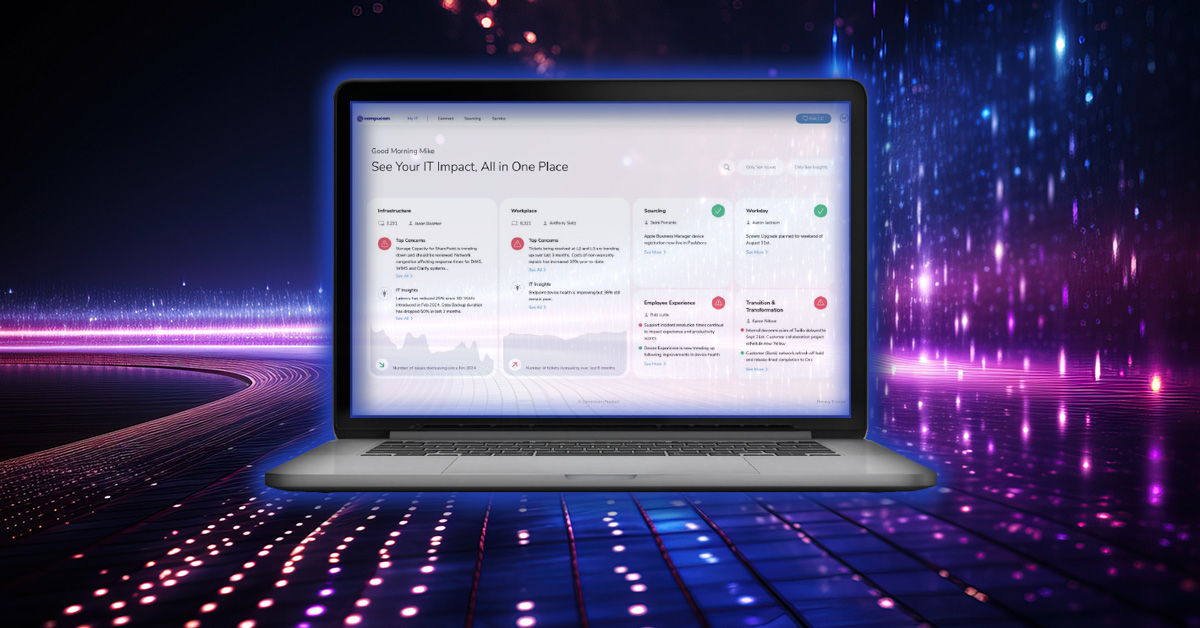- Managed Infrastructure and Cloud Services
- Advanced Technology


Emma Mak • Staff Writer
Amidst the turbulence of recent years, patients have observed how healthcare, a former laggard in providing fast, convenient, digitally enabled experiences, was quick to innovate. And now they’re not easing up — holding providers accountable to maintain that innovation momentum.
Digital transformation used to mainly refer to turning paper processes digital. Now, with the rise of artificial intelligence (AI) and cloud technologies, it often means thinking outside the box (or outside the hospital walls) to create new and innovative ways of improving processes, reducing costs, and delivering better patient care and outcomes to satisfy healthcare’s “consumers.” Let’s explore what consumer patients now expect and how digital transformation can help healthcare organizations deliver.
The Intersection of Digital Transformation and High Patient Expectations
Being a patient is stressful, and it just makes sense that they’ll appreciate healthcare providers’ efforts to make processes more streamlined and convenient. According to the American Hospital Association (AHA), provider organizations must work on “developing and implementing a tightly integrated mobile strategy that ties together all consumer-facing digital elements to create a seamless experience throughout the patient journey.”
Studies also show that most patients want to leverage technology to self-manage their care, have telehealth available, and schedule, change, and cancel appointments online. An effective strategy could include the following components:
1. Fast and Convenient Interactions
- AI Chatbots: These virtual assistants can handle routine queries and appointment scheduling and provide some general health information 24/7. They’re a quick way for patients to get answers, reducing the need for phone calls or in-person visits, which allows healthcare staff to focus on more complex tasks.
- Cloud-Based Appointment Systems: Cloud platforms enable seamless appointment booking, rescheduling, and reminders. Patients can access these services from anywhere, making them super convenient. Providers can analyze appointment data for optimization.
2. Digital Solutions
- Electronic Health Records (EHRs) in the Cloud: Cloud-based EHRs allow seamless data sharing among providers and easy scalability for growing data volumes.
- Telemedicine Platforms: Telehealth solutions enable virtual consultations, improving access for patients and making a great step towards healthcare access equality for rural and elderly patients.
- Mobile Health Apps: Cloud-based apps support health tracking, medication reminders, and personalized recommendations. Using them can keep patients actively participating in their health management and allow for easy data collection of health metrics to inform clinicians’ decisions.
3. Personalized Treatment Options
- AI-Driven Personalization: AI can help clinicians tailor treatment plans based on the analysis of patient data, including medical history, genetics, and lifestyle. Predictions can be made for optimal drug choices, and risk assessment can help avoid potential adverse effects.
- Patient Portals: Portals on the cloud empower patients to have access to test results, treatment plans, and educational materials. Patients are better able to self-manage their personal information and preferences and can securely message with their providers.
How an MSP Can Help with Healthcare Digital Transformation
A managed service provider can play a crucial role in supporting healthcare organizations as they navigate the intersection of patient expectations, digital transformation, and cost-effectiveness.
Infrastructure and Cloud Services
Healthcare cloud usage is gradually replacing on-premises infrastructure. However, many healthcare providers are still early in the process and have yet to adopt mature solutions that maximize the benefits of the cloud and the opportunities it brings for better patient experience and care.
When selecting the right cloud platform to ensure security, scalability, and cost optimization, an experienced MSP can guide you to the right solution and take care of deployment and maintenance. Ensure the MSP you select has experienced resources who can properly integrate AI for IT Operations (AIOps) platform tools to ensure your infrastructure is properly monitored, optimized, and managed.
An MSP can also help with data center management, ensuring high availability, disaster recovery, and compliance with industry standards such as the Health Insurance Portability and Accountability Act (HIPAA).
Security and Compliance
While healthcare organizations must look to innovate and provide consumer-like experiences for patients, this must not be at the expense of losing privacy. Healthcare organizations are a favorite target of cybercriminals due to their data’s high monetary and intelligence value, including intellectual property and patients’ health records and financial information. Staying on top of constant threats can be too much for a healthcare provider’s internal team.
An experienced MSP can help make improvements that will enhance your cybersecurity posture. By conducting vulnerability assessments and designing and implementing robust security measures, an MSP with trusted security partners, such as Cisco and Stratejm, can help protect patient data, ensure compliance with regulations, and coordinate solutions that monitor for ongoing threats.
Compucom: An Ideal Partner for Elevating Patient Digital Experience
Compucom offers a comprehensive portfolio of services, encompassing Technology Sourcing, Managed Services and IT Support, and Projects and Professional services, including IT staffing, to help you reach your digital transformation goals.
By getting multiple services from one provider, you simplify IT and gain a strategic partner who deeply understands your operations and can add value to all aspects of your business. Look to us for all things IT so you can give your patients great digital experiences while you meet their healthcare needs.
RecenT

9 Ways Strategic IT Staffing Empowers Organizations

Case Studies: Asset Intelligence and Endpoint Compliance Made Easy

AI and the Enterprise: The Future of IT Management

Exploring the Opportunities and Obstacles of AI in the Enterprise

One Dashboard to Rule Them All: Strategic IT Excellence with Full Lifecycle Observability

Transforming IT Operations with Full Lifecycle Observability: How Compucom’s FLO Framework Redefines Data-Driven Efficiency
TOPICS
Digital Transformation and the Rising Expectations of Patients as Consumers
- Managed Infrastructure and Cloud Services
- Advanced Technology

Emma Mak • Staff Writer
Amidst the turbulence of recent years, patients have observed how healthcare, a former laggard in providing fast, convenient, digitally enabled experiences, was quick to innovate. And now they’re not easing up — holding providers accountable to maintain that innovation momentum.
Digital transformation used to mainly refer to turning paper processes digital. Now, with the rise of artificial intelligence (AI) and cloud technologies, it often means thinking outside the box (or outside the hospital walls) to create new and innovative ways of improving processes, reducing costs, and delivering better patient care and outcomes to satisfy healthcare’s “consumers.” Let’s explore what consumer patients now expect and how digital transformation can help healthcare organizations deliver.
The Intersection of Digital Transformation and High Patient Expectations
Being a patient is stressful, and it just makes sense that they’ll appreciate healthcare providers’ efforts to make processes more streamlined and convenient. According to the American Hospital Association (AHA), provider organizations must work on “developing and implementing a tightly integrated mobile strategy that ties together all consumer-facing digital elements to create a seamless experience throughout the patient journey.”
Studies also show that most patients want to leverage technology to self-manage their care, have telehealth available, and schedule, change, and cancel appointments online. An effective strategy could include the following components:
1. Fast and Convenient Interactions
- AI Chatbots: These virtual assistants can handle routine queries and appointment scheduling and provide some general health information 24/7. They’re a quick way for patients to get answers, reducing the need for phone calls or in-person visits, which allows healthcare staff to focus on more complex tasks.
- Cloud-Based Appointment Systems: Cloud platforms enable seamless appointment booking, rescheduling, and reminders. Patients can access these services from anywhere, making them super convenient. Providers can analyze appointment data for optimization.
2. Digital Solutions
- Electronic Health Records (EHRs) in the Cloud: Cloud-based EHRs allow seamless data sharing among providers and easy scalability for growing data volumes.
- Telemedicine Platforms: Telehealth solutions enable virtual consultations, improving access for patients and making a great step towards healthcare access equality for rural and elderly patients.
- Mobile Health Apps: Cloud-based apps support health tracking, medication reminders, and personalized recommendations. Using them can keep patients actively participating in their health management and allow for easy data collection of health metrics to inform clinicians’ decisions.
3. Personalized Treatment Options
- AI-Driven Personalization: AI can help clinicians tailor treatment plans based on the analysis of patient data, including medical history, genetics, and lifestyle. Predictions can be made for optimal drug choices, and risk assessment can help avoid potential adverse effects.
- Patient Portals: Portals on the cloud empower patients to have access to test results, treatment plans, and educational materials. Patients are better able to self-manage their personal information and preferences and can securely message with their providers.
How an MSP Can Help with Healthcare Digital Transformation
A managed service provider can play a crucial role in supporting healthcare organizations as they navigate the intersection of patient expectations, digital transformation, and cost-effectiveness.
Infrastructure and Cloud Services
Healthcare cloud usage is gradually replacing on-premises infrastructure. However, many healthcare providers are still early in the process and have yet to adopt mature solutions that maximize the benefits of the cloud and the opportunities it brings for better patient experience and care.
When selecting the right cloud platform to ensure security, scalability, and cost optimization, an experienced MSP can guide you to the right solution and take care of deployment and maintenance. Ensure the MSP you select has experienced resources who can properly integrate AI for IT Operations (AIOps) platform tools to ensure your infrastructure is properly monitored, optimized, and managed.
An MSP can also help with data center management, ensuring high availability, disaster recovery, and compliance with industry standards such as the Health Insurance Portability and Accountability Act (HIPAA).
Security and Compliance
While healthcare organizations must look to innovate and provide consumer-like experiences for patients, this must not be at the expense of losing privacy. Healthcare organizations are a favorite target of cybercriminals due to their data’s high monetary and intelligence value, including intellectual property and patients’ health records and financial information. Staying on top of constant threats can be too much for a healthcare provider’s internal team.
An experienced MSP can help make improvements that will enhance your cybersecurity posture. By conducting vulnerability assessments and designing and implementing robust security measures, an MSP with trusted security partners, such as Cisco and Stratejm, can help protect patient data, ensure compliance with regulations, and coordinate solutions that monitor for ongoing threats.
Compucom: An Ideal Partner for Elevating Patient Digital Experience
Compucom offers a comprehensive portfolio of services, encompassing Technology Sourcing, Managed Services and IT Support, and Projects and Professional services, including IT staffing, to help you reach your digital transformation goals.
By getting multiple services from one provider, you simplify IT and gain a strategic partner who deeply understands your operations and can add value to all aspects of your business. Look to us for all things IT so you can give your patients great digital experiences while you meet their healthcare needs.
Recent Blogs

9 Ways Strategic IT Staffing Empowers Organizations

Case Studies: Asset Intelligence and Endpoint Compliance Made Easy

AI and the Enterprise: The Future of IT Management

Exploring the Opportunities and Obstacles of AI in the Enterprise

One Dashboard to Rule Them All: Strategic IT Excellence with Full Lifecycle Observability




